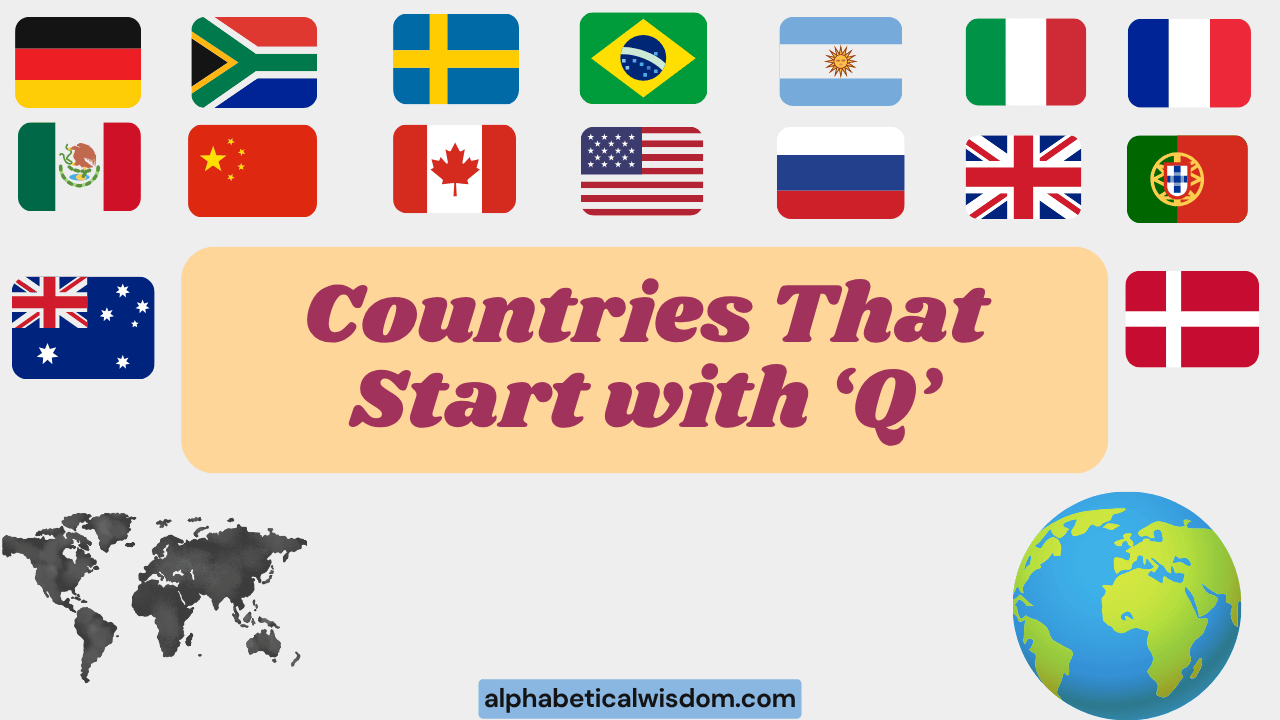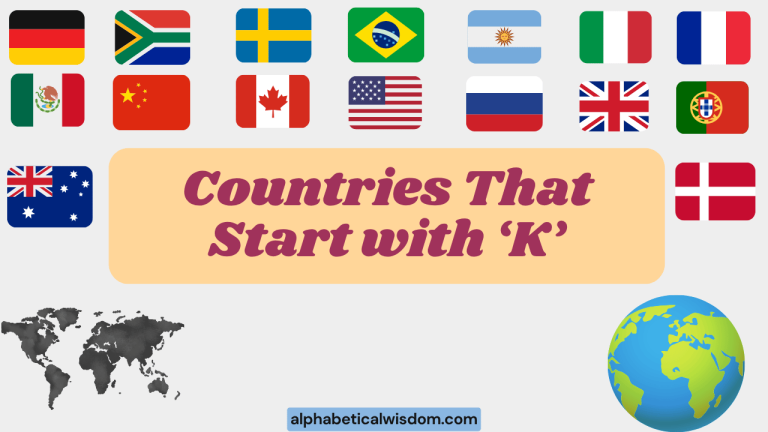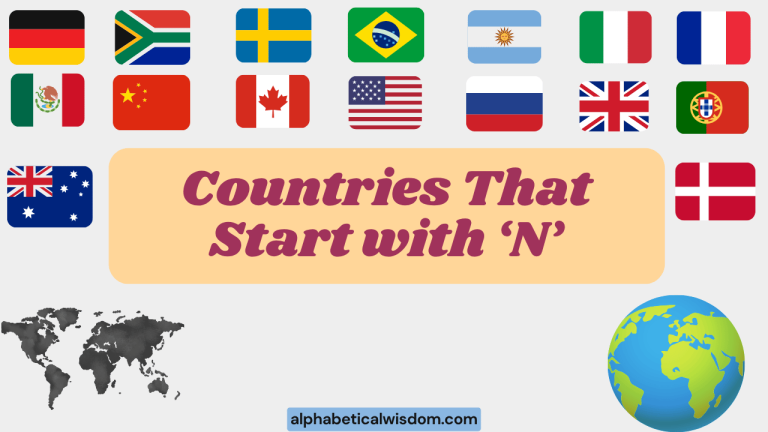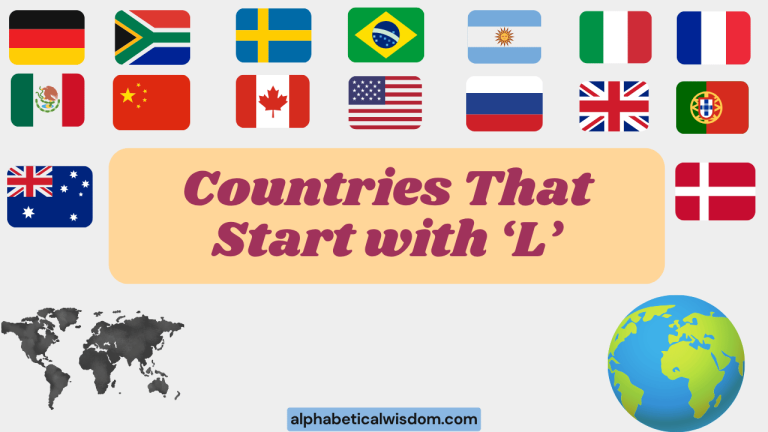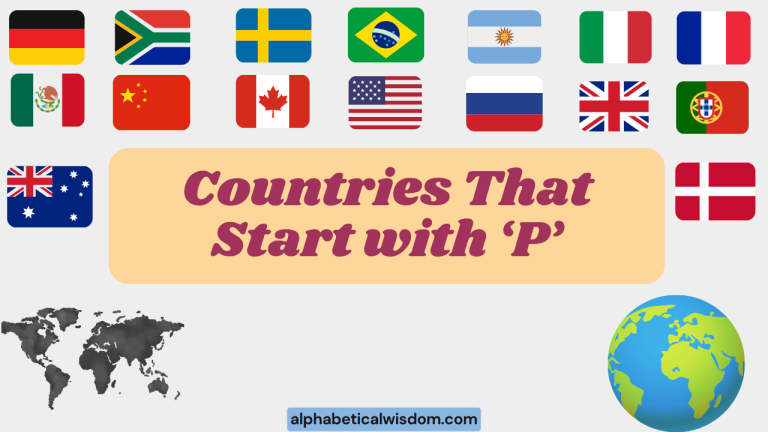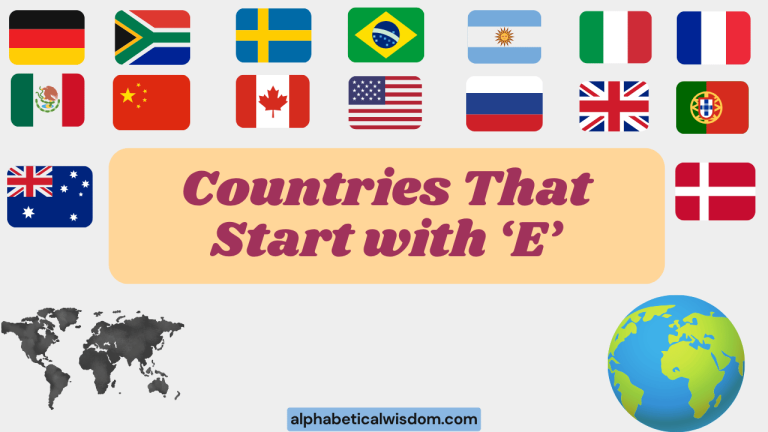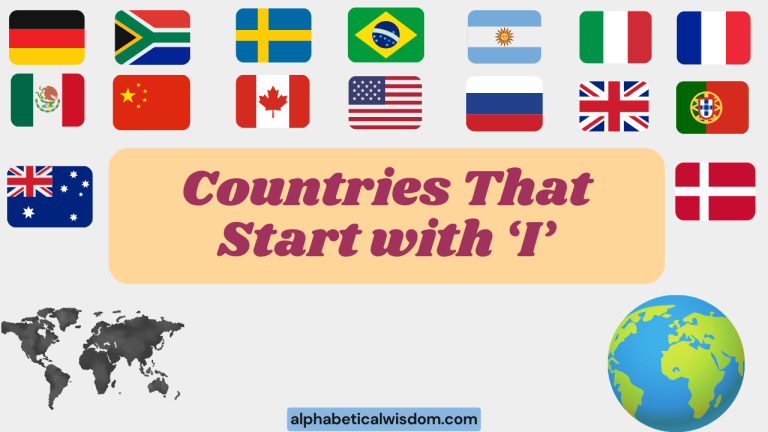Countries That Start With Q: Grammar & Usage Guide
Understanding how to correctly use country names in English grammar, especially those starting with less common letters like ‘Q,’ is crucial for clear and accurate communication. This article provides a comprehensive guide to the grammatical aspects of countries beginning with ‘Q,’ including proper noun usage, article usage, and common pitfalls.
This resource is perfect for English language learners, writers, travelers, and anyone seeking to improve their understanding of geographical terminology in English.
Whether you’re writing a travel blog, crafting a formal report, or simply engaging in everyday conversation, mastering the correct usage of country names will enhance your fluency and credibility. This guide will break down the complexities, offer numerous examples, and provide practical exercises to solidify your knowledge and confidence.
Table of Contents
- Introduction
- Definition: Countries Starting with ‘Q’
- Structural Breakdown
- Types or Categories
- Examples
- Usage Rules
- Common Mistakes
- Practice Exercises
- Advanced Topics
- FAQ
- Conclusion
Definition: Countries Starting with ‘Q’
A country, in the context of geography and political science, is a distinct territorial body or political entity, typically identified by defined borders, a population, a government, and sovereignty. When we specifically discuss countries starting with the letter ‘Q,’ we are referring to nations whose official English names begin with this letter. Currently, the most recognized country that starts with ‘Q’ is Qatar.
The classification of countries is based on international recognition, membership in global organizations like the United Nations, and established diplomatic relations. The function of identifying countries is to facilitate international communication, trade, and cooperation.
The contexts in which we use country names range from everyday conversations about travel and current events to formal documents like passports, treaties, and academic research papers.
Structural Breakdown
The structural breakdown of country names is relatively straightforward. Country names are typically proper nouns, which means they refer to a specific, unique entity. As proper nouns, they are always capitalized in English. The basic structure consists of the name itself, and sometimes, an optional article (e.g., “the United States”).
For Qatar, the structure is simply “Qatar.” There are no modifying adjectives or additional components typically associated with the name. The simplicity of the name makes its grammatical usage quite direct.
However, understanding the broader context of how country names function as subjects, objects, and within prepositional phrases is essential for correct sentence construction.
Types or Categories
While the list of countries starting with ‘Q’ is limited, it’s important to consider the different ways country names can be categorized based on grammatical function and usage:
Geographical Categories
Countries can be categorized geographically by continent, region, or climate. For example, Qatar is located in the Middle East and is known for its desert climate.
Political Categories
Countries can also be categorized politically based on their form of government (e.g., monarchy, republic), political system (e.g., democracy, autocracy), or international alliances (e.g., NATO, OPEC). Qatar, for instance, is an emirate.
Linguistic Categories
From a linguistic perspective, country names can be categorized by their origin and etymology. The name “Qatar” is believed to derive from “Catara,” an ancient name for the region.
Examples
This section provides a variety of examples demonstrating the correct usage of “Qatar” in different contexts.
Examples in Sentences
The following table illustrates the use of “Qatar” in various sentence structures. Each example demonstrates how the country’s name functions as a subject, object, or part of a prepositional phrase.
| Sentence Type | Example Sentence |
|---|---|
| Subject | Qatar is a major exporter of natural gas. |
| Object | I plan to visit Qatar next year. |
| Object of Preposition | The conference will be held in Qatar. |
| Possessive | Qatar’s economy is heavily reliant on oil and gas. |
| Adjective | The Qatari government is investing heavily in education. |
| Compound Subject | Qatar and the United Arab Emirates are important trading partners. |
| Object Complement | They consider him a resident of Qatar. |
| Appositive | Doha, Qatar, is a modern and rapidly developing city. |
| Part of a Title | “The History of Qatar” is a fascinating book. |
| Indirect Object | They gave Qatar the opportunity to host the World Cup. |
| With a Verb | Qatar hosted the FIFA World Cup in 2022. |
| Descriptive | Modern Qatar boasts impressive architecture. |
| Comparative | Qatar’s climate is hotter than many European countries. |
| Superlative | Qatar is one of the richest countries in the world. |
| Negative Statement | Qatar is not located in Africa. |
| Question | Have you ever been to Qatar? |
| Exclamation | Qatar is an amazing country! |
| Complex Sentence | Although Qatar is small, it has a significant global influence. |
| Passive Voice | The World Cup was hosted by Qatar. |
| Conditional Sentence | If I travel to the Middle East, I will visit Qatar. |
| Infinitive Phrase | To visit Qatar is my dream. |
| Gerund Phrase | Visiting Qatar was an unforgettable experience. |
| Participle Phrase | Having visited Qatar, I can recommend it. |
| Noun Clause | What makes Qatar unique is its culture. |
| Adjective Clause | Qatar, which is in the Middle East, is very wealthy. |
| Adverb Clause | Because Qatar is rich, it invests heavily in infrastructure. |
| Coordinate Clause | Qatar is hot, and it is also modern. |
| Correlative Conjunction | Both the culture and the economy of Qatar are fascinating. |
Examples in Conversations
This table presents examples of how “Qatar” might be used in everyday conversations. These examples illustrate natural language use and common topics related to the country.
| Conversation Topic | Example Dialogue |
|---|---|
| Travel Plans | A: “I’m thinking of visiting the Middle East.” B: “You should definitely check out Qatar!” |
| Sports | A: “Did you watch the World Cup?” B: “Yeah, it was amazing that Qatar hosted it.” |
| Business | A: “Our company is expanding internationally.” B: “Have you considered opportunities in Qatar?” |
| Culture | A: “I’m interested in learning about different cultures.” B: “You would find Qatar’s traditions fascinating.” |
| Education | A: “Where should I study Arabic?” B: “Qatar has some excellent language programs.” |
| News | A: “Did you hear about the new developments in the Middle East?” B: “Yes, Qatar is playing a key role.” |
| Food | A: “I love Middle Eastern food!” B: “You have to try the local cuisine when you’re in Qatar.” |
| Geography | A: “Where exactly is Qatar located?” B: “It’s on the Arabian Peninsula, bordering Saudi Arabia.” |
| Politics | A: “What’s the political climate like in the region?” B: “Qatar has a unique position in the Gulf.” |
| Investment | A: “I’m looking for investment opportunities.” B: “Qatar offers various incentives for foreign investors.” |
| Weather | A: “I heard the weather in the Middle East is extreme.” B: “Yes, Qatar can get very hot in the summer.” |
| History | A: “I’m reading about the history of the Gulf countries.” B: “Qatar has a rich and fascinating past.” |
| Architecture | A: “I’m impressed by modern architecture.” B: “You should see the skyscrapers in Qatar.” |
| Technology | A: “Which countries are investing in technology?” B: “Qatar is making significant strides in tech development.” |
| Luxury | A: “Where can you find the most luxurious hotels?” B: “Qatar is known for its opulent accommodations.” |
| Fashion | A: “I’m interested in Middle Eastern fashion.” B: “Qatar has a thriving fashion scene.” |
| Family | A: “Where would you recommend for a family vacation?” B: “Qatar offers many family-friendly activities.” |
| Art | A: “Are there any good art museums in the Middle East?” B: “Qatar has some impressive art collections.” |
| Shopping | A: “Where can I find the best shopping malls?” B: “Qatar has numerous high-end shopping destinations.” |
| Festivals | A: “Are there any interesting festivals in the Middle East?” B: “Qatar hosts various cultural festivals.” |
Examples in Writing
The following table provides examples of how “Qatar” can be used in different types of writing, from formal reports to creative writing pieces.
| Type of Writing | Example Sentence |
|---|---|
| Formal Report | The economic growth of Qatar has been significant in recent years. |
| Academic Paper | This study examines the impact of globalization on the culture of Qatar. |
| News Article | Qatar is investing heavily in renewable energy sources. |
| Travel Blog | My trip to Qatar was an unforgettable experience filled with amazing sights and sounds. |
| Literary Text | The desert wind whispered secrets across the sands of Qatar. |
| Business Proposal | Our company proposes to establish a new branch in Qatar. |
| Government Document | The government of Qatar is committed to sustainable development. |
| Legal Document | This contract is governed by the laws of Qatar. |
| Scientific Research | The research team conducted fieldwork in Qatar to study desert ecosystems. |
| Historical Account | In the early 20th century, Qatar was under British protection. |
| Promotional Material | Visit Qatar and experience the beauty of the Arabian Gulf. |
| Technical Manual | This equipment is designed to withstand the harsh climate of Qatar. |
| Personal Essay | My journey to Qatar changed my perspective on the world. |
| Poetry | In Qatar’s sun, the sands gleam bright. |
| Script Writing | Scene: A bustling market in Qatar. |
| Social Media Post | Just landed in Qatar! So excited to explore this amazing country. #Qatar #Travel |
| I’m writing to inform you about the upcoming conference in Qatar. | |
| Resume | Experience: Worked as a consultant in Qatar. |
| Cover Letter | I am eager to contribute to your team in Qatar. |
| Grant Proposal | This project aims to promote cultural exchange between the US and Qatar. |
Usage Rules
Understanding the usage rules for country names is essential for accurate and grammatically correct writing. These rules cover various aspects such as capitalization, article usage, preposition choice, and adjective formation.
General Rules
Capitalization: As proper nouns, country names are always capitalized. This rule applies regardless of where the name appears in a sentence. For example: “Qatar is a rich country.”
Singular Form: Country names are typically used in the singular form, even if the country is composed of multiple islands or regions. For example: “Qatar is located in the Middle East,” not “Qatars are located in the Middle East.”
Article Usage
Most country names do not require an article (the). However, there are exceptions, typically for countries with plural names, compound names, or names that include words like “kingdom,” “republic,” or “states.” “Qatar” does not require an article. You would say “I’m going to Qatar,” not “I’m going to the Qatar.”
Preposition Usage
The choice of preposition depends on the context of the sentence. Common prepositions used with country names include in, to, from, of, and at.
- In: Used to indicate location within the country. Example: “The conference is in Qatar.”
- To: Used to indicate movement or direction towards the country. Example: “I am traveling to Qatar.”
- From: Used to indicate origin or departure from the country. Example: “He is from Qatar.”
- Of: Used to indicate possession or association. Example: “The culture of Qatar is rich.”
- At: Used to indicate a specific location or event within the country. Example: “I met him at a conference in Qatar.”
Adjective Formation
Most country names have a corresponding adjective form, which is used to describe something originating from or related to that country. For “Qatar,” the adjective form is “Qatari.” Example: “He is a Qatari citizen.”
The adjective form is also used to describe the people of that country. For example: “The Qatari people are known for their hospitality.”
Common Mistakes
Even experienced English speakers sometimes make mistakes when using country names. Here are some common errors and how to avoid them:
| Incorrect | Correct | Explanation |
|---|---|---|
| I am going to the Qatar. | I am going to Qatar. | “Qatar” does not require the article “the.” |
| Qatars are rich. | Qatar is rich. | Country names are typically singular. |
| He is from Qater. | He is from Qatar. | Correct spelling is crucial. |
| The Qatar’s culture. | Qatar’s culture. | No article is needed before the possessive. |
| Qatari people is friendly. | Qatari people are friendly. | “People” is plural, so use the plural verb “are.” |
Practice Exercises
These exercises will help you practice using “Qatar” correctly in different contexts. Each exercise focuses on a specific aspect of grammar and usage.
Exercise 1: Fill in the Blanks
Fill in the blanks with the correct form of “Qatar” or “Qatari.”
| Question | Answer |
|---|---|
| 1. I am traveling to _________ next month. | Qatar |
| 2. He is a _________ citizen. | Qatari |
| 3. The capital of _________ is Doha. | Qatar |
| 4. _________ hosted the World Cup in 2022. | Qatar |
| 5. The _________ government is investing in education. | Qatari |
| 6. She is from _________. | Qatar |
| 7. _________’s economy is growing rapidly. | Qatar’s |
| 8. The culture of _________ is fascinating. | Qatar |
| 9. He speaks _________ Arabic. | Qatari |
| 10. I met him in _________. | Qatar |
Exercise 2: Correct the Errors
Identify and correct the errors in the following sentences.
| Incorrect Sentence | Correct Sentence |
|---|---|
| 1. I am going to the Qatar. | I am going to Qatar. |
| 2. Qatars are rich in oil. | Qatar is rich in oil. |
| 3. He is a citizen of Qater. | He is a citizen of Qatar. |
| 4. The Qatar’s culture is unique. | Qatar’s culture is unique. |
| 5. Qatari people is very friendly. | Qatari people are very friendly. |
| 6. She study in Qatar university. | She studies at Qatar University. |
| 7. I like the food of Qater. | I like the food of Qatar. |
| 8. The weather in Qatars is hot. | The weather in Qatar is hot. |
| 9. He is a Qatari’s man. | He is a Qatari man. |
| 10. I have been to the Qatars. | I have been to Qatar. |
Exercise 3: Sentence Construction
Construct sentences using the following prompts, incorporating “Qatar” or “Qatari.”
| Prompt | Example Sentence |
|---|---|
| 1. Travel to… | I would love to travel to Qatar someday. |
| 2. Culture in… | The culture in Qatar is a blend of tradition and modernity. |
| 3. Economy of… | The economy of Qatar is heavily dependent on natural gas. |
| 4. A citizen of… | He is a citizen of Qatar. |
| 5. Government in… | The government in Qatar is investing in renewable energy. |
| 6. Located in… | Qatar is located in the Middle East. |
| 7. Known for… | Qatar is known for its wealth and modern architecture. |
| 8. Visit… | You should visit Qatar to experience its unique culture. |
| 9. People from… | People from Qatar are generally very hospitable. |
| 10. Study in… | I plan to study in Qatar to learn Arabic. |
Advanced Topics
For advanced learners, it’s important to understand more complex aspects of country name usage, including historical names and regional variations.
Historical Names
Understanding the historical context of country names can provide deeper insight into their usage. While “Qatar” has remained relatively consistent, some regions have undergone name changes due to political or geographical shifts.
Knowing these historical names can be beneficial when reading older texts or historical documents. It is important to note any previous colonial names or protectorate statuses that may have influenced historical references to Qatar.
Regional Variations
While English is widely used, there can be regional variations in pronunciation and usage of country names. It’s helpful to be aware of these variations, especially when communicating with people from different English-speaking countries.
For instance, while the spelling of “Qatar” remains consistent, the pronunciation might vary slightly between American and British English speakers. Additionally, non-native English speakers may have different pronunciations influenced by their native languages.
FAQ
Here are some frequently asked questions about using country names, specifically “Qatar,” in English:
- Is it correct to say “the Qatar”?
No, it is not correct. The country name “Qatar” does not require the definite article “the.” You should simply say “Qatar.” - What is the adjective form of “Qatar”?
The adjective form of “Qatar” is “Qatari.” It is used to describe things or people from Qatar. - Do I capitalize “Qatar” in a sentence?
Yes, always capitalize “Qatar” because it is a proper noun. Proper nouns refer to specific people, places, or things and always begin with a capital letter. - Which preposition should I use with “Qatar”?
The preposition you use depends on the context. Common prepositions include “in,” “to,” “from,” and “of.” For example, “I live in Qatar,” “I am going to Qatar,” “He is from Qatar,” and “The culture of Qatar is rich.” - Can “Qatar” be used in a plural form?
No, “Qatar” is generally used in the singular form. - What is the correct pronunciation of “Qatar”?
The pronunciation can vary slightly, but it is generally pronounced as “ˈkætɑːr” (KA-tar) or “kəˈtɑːr” (kuh-TAR). - Is “Qatari” used for both singular and plural nouns?
“Qatari” is primarily an adjective. To refer to a person from Qatar, you can say “a Qatari citizen” (singular) or “Qatari citizens” (plural). You can also say “the Qatari people” (plural). - How do I use “Qatar” in a possessive form?
To show possession, use “‘s.” For example, “Qatar’s economy” means “the economy of Qatar.” - Are there any common misspellings of “Qatar”?
Yes, common misspellings include “Qater” or “Katar.” Always double-check the spelling to ensure accuracy. - What is the demonym for people from Qatar?
The demonym for people from Qatar is “Qatari.”
Conclusion
Mastering the grammar and usage of country names, particularly those starting with less common letters like ‘Q,’ is vital for effective communication in English. This comprehensive guide has provided a detailed overview of the rules, examples, and common pitfalls associated with using “Qatar” in various contexts.
By understanding these principles, you can confidently and accurately incorporate geographical references into your writing and speech.
Remember to always capitalize country names, use the correct prepositions, and avoid common errors such as adding unnecessary articles. Consistent practice and attention to detail will further enhance your fluency and precision.
With these tools, you are well-equipped to navigate the nuances of English grammar and communicate effectively about global locations.
